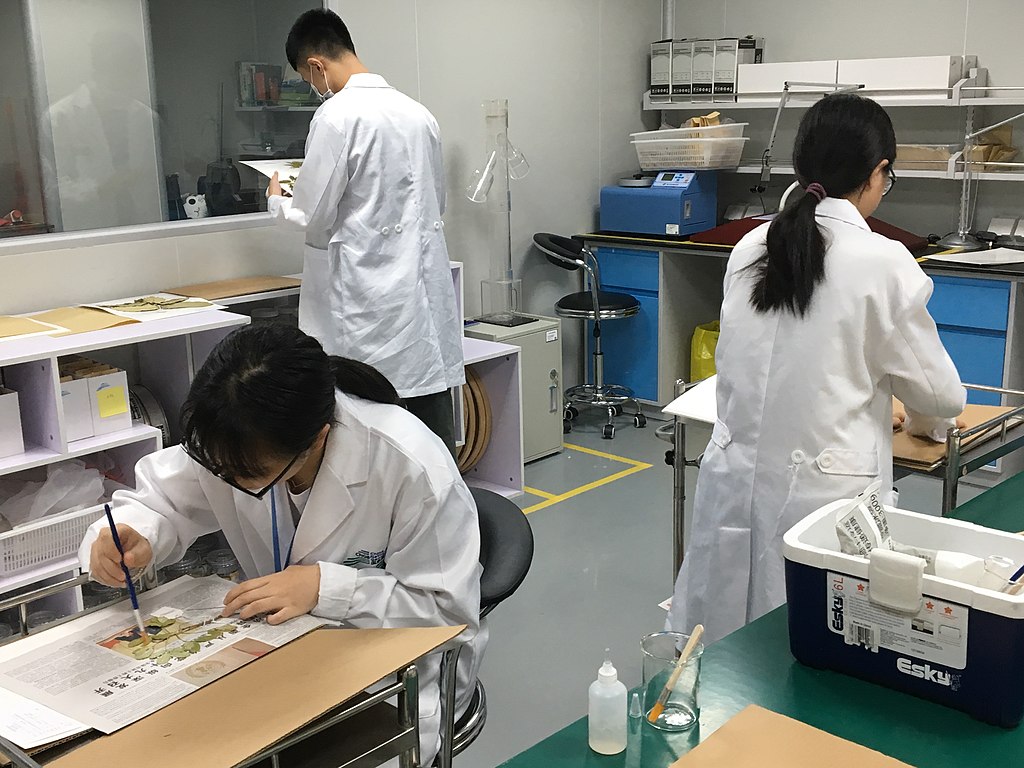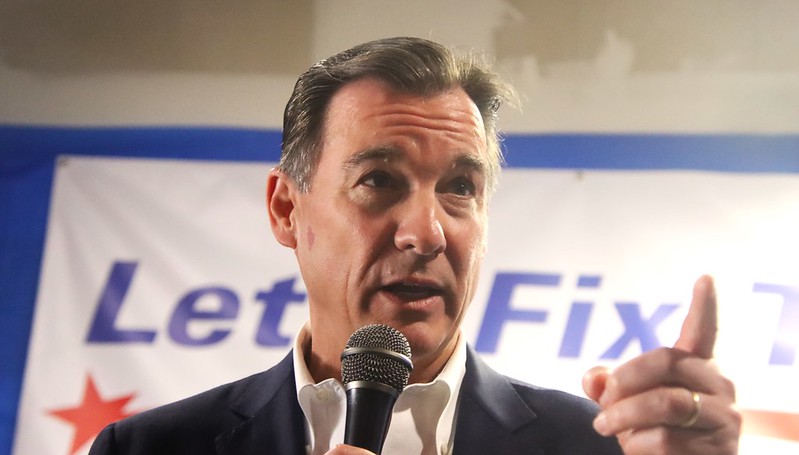Good morning, and welcome to The Yappie’s AAPI politics briefing — your guide to the policy news and activism affecting Asian Americans + Pacific Islanders. Send tips and feedback to [email protected] and support our work by making a donation.
— Edited by Shawna Chen
The Biden Era
SUPREME COURT DECLINES TO REVIEW ANOTHER RACE-CONSCIOUS ADMISSIONS CASE: The Supreme Court has decided not to hear a challenge to the admissions policy at the Thomas Jefferson High School for Science and Technology, an elite magnet school in Virginia. Critics and parent groups had sued the school alleging that the “race-neutral” policy discriminates against qualified Asian American applicants.
- Thomas Jefferson revised its admissions process in 2020 to consider socioeconomic status and remove standardized test scores, among other changes. In the first class admitted following the update, the share of Asian Americans dropped from about 70% to roughly 50%, Washington Post’s Ann E. Marimow and Karina Elwood report.
- Yes, but: The number of low-income Asian Americans admitted rose from one to 51 after the changes, and Asian American students from middle schools that were historically underrepresented at TJ saw a sixfold increase in offers, according to the 4th Circuit Court of Appeals’ opinion upholding TJ’s new admissions policy.
- Meanwhile, the percentage of admitted students more than doubled for both Black and Hispanic populations.
- Several civil rights groups, including Asian Americans Advancing Justice – AAJC, celebrated the Supreme Court’s decision to leave the appeals court ruling as is, emphasizing TJ’s admissions changes as an equalizer—especially as some elite colleges consider reinstating standardized test requirements. Opponents of the policy, though, counter that it will continue to negatively impact Asian American students.
- The move follows the Supreme Court’s recent refusal to immediately mandate that the U.S. Military Academy West Point change its race-conscious admissions policy. Some saw it as a signal of the court’s unreadiness or unwillingness to make any further opinions on affirmative action, in part to focus on other cases this term.
- Flashpoint: Last June, the court’s conservative majority found it unlawful to consider race in the admissions process for colleges and universities, reversing decades of efforts by higher education institutions to diversify their student bodies. The ruling did not address military academies
DOD’S NUCLEAR REACTOR PLANS FINDS OPPOSITION IN GUAM: Defense officials are evaluating Guam as a potential site for a mobile nuclear reactor, but the island’s residents and elected officials alike are skeptical that the U.S. won’t repeat the mistakes of its nuclear waste legacy.
- Federal officials visited Guam as part of a cross-country assessment of potential sites for Project Pele, a transportable nuclear power reactor that the U.S. Department of Defense says will produce one to five megawatts of net electrical power for three years, Pacific Island Times’ Frank Whitman writes.
- Caveat: The technology is still in development, which raised alarms for some legislators during a recent meeting, Joe Taitano reports for Pacific Daily News.
- Several Guam lawmakers highlighted concerns about the fallout from a Chinese missile striking the mobile nuclear reactor if it’s based in Guam. Others skewered the DoD for seeking to operate a technology that hasn’t yet been well-tested on an island still suffering the aftermath of military buildup and radiation from environmental contamination.
- In their words: “DoD does not have a very good history on Guam, with regards to how it’s handled disposal of what we would consider chemicals and other things that have not been so good to our environment,” Guam Sen. Joanne Brown (R) said at one point.
- Both Brown and Guam Sen. Sabina Flores Perez (D) pointed to nuclear weapons testing around the Marshall Islands and the U.S.’s failures with accountability. Perez also accused the DoD of waging a PR campaign: “I just can’t believe that you’re trying to make the claims that it’s safe in a community that has suffered for so many years regarding radiation exposure.”
- DoD Strategic Capabilities Office program manager Jeff Waksman emphasized the nuclear power reactor’s safety but told the senators he would recommend against deploying it where local residents are opposed.
BIDEN AND HARRIS SLAM ALABAMA IVF DECISION: President Joe Biden and Vice President Kamala Harris swiftly condemned the recent Alabama Supreme Court ruling that affirmed that frozen embryos are considered children under state law. Meanwhile, GOP presidential candidate Nikki Haley appeared to agree with the decision while attempting to maintain her middle-ground approach.
- The ruling came after wrongful death lawsuits were filed by three couples whose frozen embryos were accidentally destroyed at a fertility clinic. It could hold wider implications for fertility treatments—particularly in vitro fertilization, or IVF—in Alabama and beyond. Biden cited the decision as a direct consequence of the June 2022 U.S. Supreme Court ruling to overturn Roe v. Wade, which he is pushing to restore.
- Around 45% of Asian Americans have reported that they or someone they know has used fertility treatments, according to a September survey by the Pew Research Center. Historically, Asian Americans have faced challenges in accessing reproductive health care due to cultural stigma, language barriers, low health literacy, and more.
- A 2022 Pew survey found that, at 74%, Asian Americans have the largest share of support for abortion rights than any other racial group.
- On our radar: Haley has adopted a moderate stance on abortion while on the campaign trail, which has at times alienated members of her own party as well as more moderate liberal voters. “Embryos, to me, are babies,” Haley told NBC News last week. “I do see where that’s coming from.” In an interview later with Newsmax though, she said: “You don't want to take those fertility treatments away from women.”
On The Hill


LAWMAKERS MOVE TO SECURE BIOTECH DATA: New legislation seeks to ban certain Chinese biotech companies from accessing genetic and personal health data in the U.S.
- The bipartisan “BIOSECURE Act,” brought by the Select Committee on the Chinese Communist Party (CCP), would ban medical providers who receive federal funding from using certain biotech companies controlled by a “foreign adversary.” Reps. Mike Gallagher (R-Wisconsin) and Raja Krishnamoorthi (D-Illinois) introduced the bill in the House.
- A big concern is “that when they sell those equipment and goods in the U.S., they are going to continue to collect data on Americans and then funnel it back to the CCP-controlled databases," Krishnamoorthi told Reuters on a trip to Taiwan earlier this month.
- The accompanying Senate bill was introduced last December by Sen. Gary Peters (D-Michigan), who said that any CCP-controlled company’s business practices could pose a threat to national security.
- But: Critics of the legislation have warned that restricting relations with foreign companies may hinder advances in the biotech industry that could benefit everyone, including U.S. residents.
- Some academics are also concerned that policymakers may get “too obsessed with the technology’s military applications at the cost of hindering efforts to cure disease and feed the world’s population,” Associated Press’ Didi Tang writes.
TWO-YEAR ANNIVERSARY OF CHINA INITIATIVE TERMINATION: Last week marked two years since the Department of Justice announced an end to the China Initiative, a Trump-era program that sparked accusations of racial profiling towards Asian scientists.
- The China Initiative, which the DOJ spearheaded to crack down on academic espionage, largely resulted in minor fraud charges against researchers that ended in mistrial or were ultimately dropped. One FBI agent testified in court that he used a Google-translated webpage to falsely implicate a Chinese Canadian scientist as having ties to the Chinese military, Shawna Chen notes for Axios.
- Though the DOJ ended the program in 2022, many Chinese researchers in the U.S. remain in fear of spying accusations due to the “guilty until proven innocent” atmosphere created by the DOJ, Nature’s Virginia Gewin writes. The risk of heightened scrutiny has led many to return to China or significantly alter the focus of their research in hopes of avoiding surveillance.
- On the anniversary of the program’s termination, members of the Congressional Asian Pacific American Caucus (CAPAC) doubled down on the need to prevent its reinstatement.
- “The Trump-era China Initiative was as shameful as it was ineffective,” Rep. Judy Chu (D-California), CAPAC chair, said in a statement. “Despite Republican efforts to reinstate this program, we must work tirelessly to ensure that the China Initiative or any program that relies on xenophobic profiling of our communities will not be permitted to exist again.
Campaign Watch


SUOZZI WINS ASIAN AMERICAN VOTE IN CRUCIAL NY RACE: Democratic Congress member Tom Suozzi (D) will be sworn in this week after clinching the special election to replace former Rep. George Santos (R-New York) in New York’s 3rd congressional district. Suozzi previously represented the district in the House from 2017 to 2023.
- Asian Americans make up roughly 18% of the district’s electorate and were expected to play a key role in determining who wins the seat, according to APIAVote.
- Suozzi’s campaign had hired two dedicated staffers for AAPI outreach and was supported by Rep. Grace Meng (D-New York), who is the first and only Asian American to represent New York in Congress, Gothamist’s Brigid Bergen reports.
- Prior to Election Day, Suozzi led in support from Asian American voters, according to an Emerson College Polling/PIX11 survey.
FIRST NONCITIZEN SWORN IN TO SF ELECTION COMMISSION: Kelly Wong, an immigrant from Hong Kong, has become the first noncitizen to serve on the San Francisco Elections Commission, KQED’s Azul Dahlstrom-Eckman writes.
- The seven-person commission oversees the city’s Department of Elections and plays a key role in spearheading related policies. All eyes are on Wong to see what she brings to the table despite her inability to vote.
- Wong, a longtime immigrant rights activist who works for the advocacy group Chinese for Affirmative Action, was appointed by San Francisco Board of Supervisors President Aaron Peskin. The move was made possible after voters passed a 2020 charter amendment to remove the citizenship requirement for serving on San Francisco boards.
- Wong was sworn in earlier this month after the Board of Supervisors unanimously approved her appointment, though she has since faced backlash from Republicans who claim that she will compromise America’s interests, The San Francisco Standard’s Han Li notes.
- She has said she hopes to increase political engagement with the city’s non-English speaking and immigrant communities and reduce language and cultural barriers that prevent them from exercising voting rights.
- In her words: “There are always voices inside my head. Like, ‘You can’t do it. You’re not competent. You’re an immigrant. This is not your country.’ That’s not true,” Wong told KQED.
- Almost 40% of San Francisco’s population is foreign-born, per U.S. Census Bureau estimates. Meanwhile, a 2022 analysis by APIAVote and AAPI Data found that 77% of Asian American adults in California speak a language other than English at home while 37% identify as having Limited English Proficiency.
🥰 Enjoying The Yappie? Make a donation, forward this briefing to a friend, or subscribe here. You can also follow us on Twitter, Instagram, and Facebook.
The Yappie is your must-read briefing on AAPI power, politics, and influence, fiscally sponsored by the Asian American Journalists Association. Make a donation, subscribe, and follow us on Twitter (@theyappie). Send tips and feedback to [email protected].









